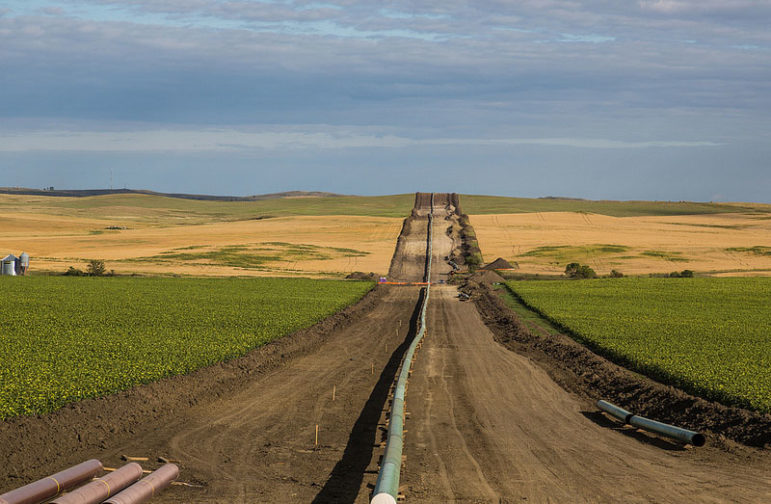
November 2, 2016; New York Times and Argus Leader (Sioux Falls, SD)
The NPQ Newswire has written several times about the Native American-led protests against the route of the Dakota Access pipeline near the Standing Rock Sioux Reservation in North Dakota. Yesterday, President Obama said in an interview with NowThis, a social media news outlet, that the U.S. Army Corps of Engineers, which controls some of the land traversed by the pipeline and also administers the Missouri River for the federal government, may be exploring alternative routing of the pipeline.
I think right now the Army Corps is examining whether there are ways to reroute this pipeline in a way. So we’re going to let it play out for several more weeks and determine whether or not this can be resolved in a way that I think is properly attentive to the traditions of the first Americans.
While the pipeline itself does not cross Standing Rock Sioux Reservation land, some tribal members, environmentalists, and others believe that sections of the 1,172-mile pipeline represent a potential danger to the Missouri River (specifically, the 370,000 acre Lake Oahe reservoir) and adjoining land the tribe considers sacred. The pipeline is being built to transport oil from the Bakken fields in northwest North Dakota to an energy transport center in Illinois from where it will be sent to oil refineries in Texas and to the east coast. The oil pipeline route being protested runs parallel to an existing natural gas pipeline under the Missouri River/Lake Oahe.
Sign up for our free newsletters
Subscribe to NPQ's newsletters to have our top stories delivered directly to your inbox.
By signing up, you agree to our privacy policy and terms of use, and to receive messages from NPQ and our partners.
Not surprisingly, reactions to the president’s statements were mixed. Standing Rock Sioux Tribal Chairman Dave Archambault II expressed support, saying, “We believe President Obama and his administration will do the right thing.” On the other hand, Vicki Granado, spokeswoman for the Energy Transfer Partners pipeline company, said in a statement, “We are not aware that any consideration is being given to a reroute, and we remain confident we will receive our easement in a timely fashion.” Morton County, North Dakota Chairman Cody Schulz criticized the president’s statement. “Rather than creating further uncertainty, the president should be sending us the support and resources necessary to enforce the law and protect people’s right to peacefully protest.”
Meanwhile, the U.S. Army Corps of Engineers requested law enforcement in North Dakota to protect federal land, arrest anyone attempting to trespass, and destroy a wooden bridge built by protestors across a creek near the protest site to facilitate access to federal property. Pepper spray, rubber bullets, and tear gas were used in the police action Wednesday afternoon, and one person was arrested for “conspiracy to commit obstruction of a government function for purchasing kayaks and canoes to be used to cross the water.” There were no reports of injuries to either protestors or law enforcement. FBI and federal Bureau of Indian Affairs (BIA) officials are “investigating reports of gunshots in the camp and a person being ‘hog-tied’ and detained by ‘camp security,’ according to the Morton County Sheriff’s Office.”
The mostly-built $3.7 billion pipeline will be difficult to reroute, according to Tyler Priest, a University of Iowa expert who was a member of the president’s National Commission studying the BP Deepwater Horizon oil spill. Acquiring new land, securing required permits, and winter construction are all obstacles that add time, expense, and logistical complexity to the project that was scheduled to be complete by the end of 2016. This assessment assumes the rerouting doesn’t spark more protests or court challenges by current or newly aggrieved parties.
Tribal Chair Archambault has indicated that compromise is possible, saying that the pipeline “doesn’t have to put our water at risk” and “everyone can still benefit.” It’s also important to remember that the weeks of review Obama referred to coincide with the end of his presidency, meaning that his successor will likely be called upon to weigh in on the issue.—Michael Wyland













